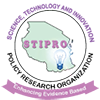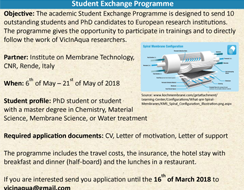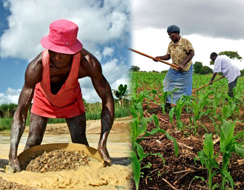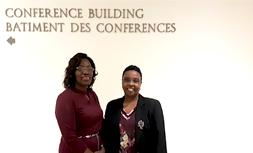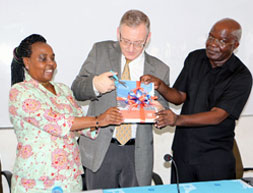-
Student Exchange Program
VicInAqua project aims at developing innovative multipurpose self-cleaning water filtration solutions adapted for sanitation of different wastewater streams, which will be reused in Recirculation Aquaculture Systems(RAS) and Agriculture Irrigation at Lake Victoria. The academic Student Exchange Programme is designed to send 10 outstanding students and PhD candidates to European research institutions. The programme gives the opportunity to participate in trainings and to directly follow the work of VicInAqua researchers. For more information about the exchange program please visit VicInAqu.
Continue reading -
STIPRO to Hold a Roundtable Discussion on Local Content Development in The Tanzania Agriculture and Mining Sectors
In order to contribute to the government’s efforts towards socio-economic development out of the oil and gas sectors, STIPRO organized a seminar on the development of local content in these sectors about four months ago. The presentations stimulated interesting debates and consequently, participants expressed the need to keep on discussing issues regarding local content development not only in the gas and oil sectors, but to also to look at other sectors with substantial participation of foreign direct investments in the county. STIPRO is currently organizing a round-table discussion titled “Local content development in the Tanzanian Agriculture and Mining Sectors: Status and Opportunities”, which will be held on Thursday, the 20th July 2017 at the Tanzania Commission for Science and Technology (COSTECH), Kijitonyama, Dar es Salaam. Representatives from the government, private sector, academia and civil society organizations have been invited to attend. The round-table is targeted at providing a platform for discussing the status, strategies and outcomes of local content development in the two sectors with the intention, among others, to establish the basic pre-conditions or requirements for ensuring effective local participation in all foreign investments in the sectors of agriculture and mining. In particular, the round-table will address the following questions: a) What is the extent of local content participation in the agriculture and mining sectors? b) What are the local strengths, weaknesses and opportunities for engagement with FDIs in the sectors of agriculture and mining? c) To what extent are the potential local participants technologically and knowledge-wise empowered? d) What are the conditions, instruments and approaches necessary to ensure local content participation in the sectors of agriculture and mining? It is expected that the round-table discussions will lead to increased awareness on the need of outlining preliminary strategies for designing the local content for the two sectors.
Continue reading -
UN STI Forum | Dr. Bitrina diyamett’S Speech
Tuesday, May 16, 2017 | Dr. Bitrina Diyamett’s Speech on STI capacity building for achieving SDGs at the 2017 UN STI Forum, 16th May, 2017, New York City On Tuesday, the 16th of May, 2017, Dr. Bitrina spoke at Session-5, which was focused at exploring currently existing STI policies for capacity building and science advisory systems, discussing the ways and means to bridge the remaining gaps. The session – in addition to Bitrina – had two other speakers: Prof. Geoffrey S. Boulton, President, CODATA and Prof. James Querry, Philadelphia University, ICGC, USA. Dr. Bitrina introduced her 7 minutes speech by saying that the session is one of the most important sessions of the Forum as it is at the heart of the strategies of achieving sustainable development: “I believe that the true meaning of sustainable development is when a society has built enough technological and innovation capabilities to competently and sustainably satisfy their social and economic needs in an inclusive way”. She concluded this introductory part by saying that the process of achieving sustainable development is actually the process of building technological and innovation capabilities, defined as the ability to produce and make effective use of technological knowledge in efforts to improve and produce new technologies – underlying the word use of knowledge. Dr. Bitrina Diyamett preparing to deliver her 7minutes speech at the conference Existing efforts to build STI capacities: Taking the example of an African continent, she explained following as existing efforts towards STI capacity building: Recognition of the importance in development – many development plans in African countries now mention the role of STI Some knowledge Infrastructure in place - institutions and ministries, e.g. Sectoral R&D institutions and technology transfer offices at universities. Promulgation and reviews of S&T policies to include innovation – e.g. Tanzania and several other African countries. Training of scientists, e.g. STEM training, with gender issues taken on board Remaining Challenges: Dr. Bitrina explained that despite the fact that some of such efforts dates as far back as the 1980s, their impact on social and economic development is minimal as poverty has either remained the same or even increased in many parts of Africa, underlying the fact that the major challenge is the policy itself. She explained that policies – in terms of enabling environment for innovation and accessing useful technologies – have been and are still central to socio-economic development in all countries. She mentioned the following as remaining policy challenges: They are not informed by local evidence, emanating from the fact that capacity for STI policy research and production of STI statistics is very poor in Africa. This shortcoming is also in part responsible for the poor science advice system in Africa – of course included also is unclear system for science advice. There is serious lack of sectoral policy coordination with that of STI: STI policies are stand alone. Poor governance of the STI system: For most governments, there is no clear overall Agency that is responsible for the coordination and capacity building of the system. There is generally poor expertise on STI policy making and implementation, largely emanating from the poor conceptual understanding of how the triplet STI works in an African context: statements that consider STI as one thing such STI funding and STI training are common. This brings ambiguities in policies, making proper implementation impossible. For instance – as a result of the poor understanding on how the triplet works together, capacity building for STI have exclusively focused on the supply side of the knowledge; and where the demand side has been considered, the focus is on exclusively small micro and isolated projects, with very little link with major systemic issues at the macro level. Three most important recommendations: i) Policy is important – good policies are determining factors in the proper functioning of the national systems of innovation, and therefore top priority should be given to capacity building in STI policy making, including STI policy research. Emphasis is especially placed on the demand side innovation policies that trigger knowledge use. More over these are policy issues that were neglected in the past efforts in STI capacity building ii) A strong private sector – especially the manufacturing, which is richest in employment – is important for development, including poverty alleviation: Train the private sector in innovation management; limited evidence indicates that companies in Africa learn and innovate only through routine activities of production and selling. However, in the currently changing innovation environment, they need to be agile, proactively searching avenues for innovation; and this requires capacity building iii) Responsible trade and investment policies, especially the FDI: These two are important vehicles for innovation capacity building. However, with the current innovation environment where there is increased rate of technological change and automation, the traditional approach to international trade is counterproductive to poor countries. First the time for learning and improving imported technologies is much shorter due to rapid technological change; and second, automation radically reduces the cost of production in developed countries, leading to cheaper imports killing local industries in poor countries. A cross-section of participants to the UN STI Forum
Continue reading -
STIPRO Calls to Embed Science, Technology and Innovation in Attaining Sustainable Development Goals 2030
Friday, February 26, 2016 Science,Technology and Innovation Policy Research Organization (STIPRO) Executive Director Dr. Bitrina Diyamett has urged Tanzanian policy makers to integrate science, technology and innovation strategies when implementing Sustainable Development Goals before 2030. Dr. Bitrina Diyamett gives a Presentation about Goal no 8 and 9 of the Sustainable Development Goals Speaking during the Policy Forum breakfast debate organized by the Policy Forum at the British Council Auditorium in Dar es Salaam, Dr. Bitrina Diyamett observed that development stakeholders should note the centrality of Science,Technology and Innovation strategies in education, industrial, agricultural, trade and investment in order to eradicate extreme poverty by 2030. Dr Bitrina noted that Goals no 8 and 9 are very central in eradicating Poverty and improving human livelihoods. “Goal no 8 is about sustained, inclusive and sustainable economic growth, full and productive employment and decent work for all. Goal no 9 encourages Build of resilient infrastructure, promote inclusive and sustainable industrialization and foster innovation.”She said She said that in order to enhance the employment potential in the Country , the industrial and agricultural sectors should be prioritized using policies informed by credible research and therefore a need to improve the current national systems of Science,Technology and Innovation. Deputy Minister of Health, Social Welfare, Gender, Elderly and Children Dr. Hamis Kigwangala gives some comments during a discussion “We need to see increased agricultural productivity, while at the same time opening avenues for the non-farm activities in the rural areas, especially in agro-processing while enhancing the marketing of agricultural products and encouraging mineral processing to provide incentives for value addition to minerals rather than raw export and technology and innovation in these are critical,” she said. Dr. Diyamett cautioned, however, that building innovation capabilities was challenging as it required coordinating policies of very diverse nature, effective governance, continuous follow up and evaluation of the performance of the system and specialized expertise, which the country to a large extent currently lacks. Explaining about Goal no 1 of the Sustainable Development Goals which focuses on ending Poverty,Senior Researcher from Research on Poverty Alleviation (REPOA) Dr. Blandina Kilama said there was a need for monitoring Poverty by collecting proper data from responsible Officers including Village Executive Officers and Ward Officers. “In curbing poverty, useful ways need to be thought out to capture all stakeholders including children, women, youth, the environment and proper governance of the right data which are traceable from the lowest administrative (personal) level” She said. She further pointed out that resource mobilization was inevitable specifically engaging more human and financial resources as it could encourage innovations brought in with improved technologies to simplify and speed up data collection, analysis and reporting. A Cross section of the participants of the Policy Forum breakfast debate held recently at the British Council Auditorium in Dar es Salaam Tanzania Deputy Minister of Health, Social welfare, Gender, Elderly and Children Dr. Hamis Kigwangala was of the views that the society should also support the Government in its effort to alleviate Poverty. “Education and Economy are two sides of the same coin in curbing Poverty for different groups in the Society.Thanks the Tanzania Government has already started to revamp these important sectors before 2030,We should also play our parts”He said Policy Forum breakfast debate is usually organized each last Friday of every Month bringing together Policy stakeholders to discuss various Policy issues for socio and economic development .This Month’s theme was “ Ending Poverty by Year 2030: The prospects and challenges" Representative of the Tanzania Planning Commission Ms. Salome Kingdom takes part in a discussion
Continue reading -
STIPRO Graces Launch Of The Technology and Innovation 2015 REPORT
Thursday, December 17, 2015 The United Nations in Tanzania has launched the Technology and Innovation Report 2015, which provides a comprehensive analysis of industry and Science, Technology and innovation policies in Tanzania and other African Countries. The United Nations Conference on Trade and Development (UNCTAD) report indicates that industrial Development and Science, Technology and innovation (STI) policies should be coordinated so as to promote technological learning, competency building and competitiveness of the African industry, especially the manufacturing sector. The report highlights some critical industrial development and innovation policy challenges facing Tanzania, Nigeria and Ethiopia, which are the three countries included in in-depth case studies. Dr. Bitrina Diyament of the Science, Technology, and Innovation Policy Research Organization (STIPRO) presents the report findings Presenting the report findings for the Tanzania country, Executive Director of the Science, Technology, and Innovation Policy Research Organization (STIPRO) Dr. Bitrina Diyamett said the existing policies do not always correspond to the reality of the situation on the ground, “Policy can only work when there is implementation and coordination…
Continue reading
